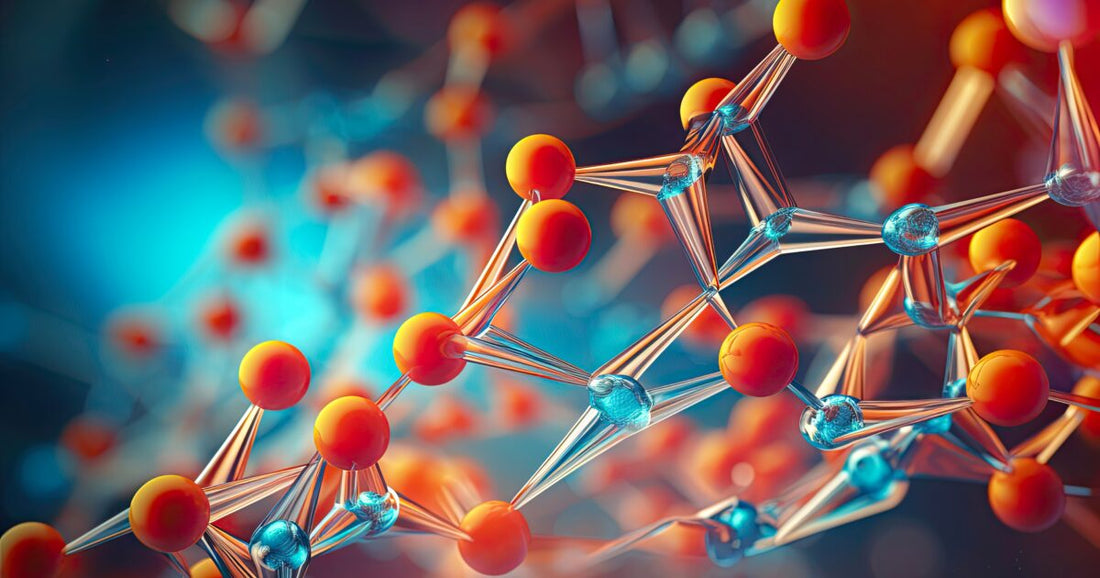
Peptides
Share
Peptides in skin care products have recently been gaining attention as it is claimed to decrease inflammation, improve skin pigmentation, and reduce the wrinkling of the skin.
It would appear that every other day, there is some hot new skin care ingredient that will revolutionize your skin. And yes, some of these are just all hype and not all that much action, while others really are worth your buck, and one such is peptides.
Peptides, also known as polypeptides, occur naturally in skin, but they're also included in many skin-care products—and for good reason.
Peptides are short chains of amino acids that form some proteins essential to the skin.
More specifically, collagen is composed of three polypeptide chains, and the addition of peptides can stimulate your skin to produce collagen. With more collagen, skin will have a more firm and youthful look.
Your body produces collagen naturally. But over time, production diminishes, and skin can become more wrinkled and less even and bright. Before you reach for that bottle, here's what to know.
Benefits of peptides
Collagen cannot actually be absorbed through skin, because the molecule is too large, and that is why so many people chose to consume collagen-rich bone broth or took collagen in supplement form.
Although that might be the case, peptides, however, can absorb into skin where they are usable by the body. The incorporation of peptides in your routine skin care has many great benefits to the skin.
Improved skin barrier
The skin barrier protects the skin from bacteria, ultraviolet rays, pollution, and other toxins. Over-exfoliation can damage the skin barrier—as can exposure to cigarette smoke and other forms of pollution, along with poor sleep. Peptides help build up a stronger barrier.
Reduced wrinkles
Collagen will give more volume to your skin and lips. Lines and wrinkles look less noticeable because the skin is firmer and fuller.
More elastic skin
Aside from collagen, peptides also comprise elastin fibers, which is also a form of protein. These fibers make the skin look more firm and taut.
Eases inflammation
These peptides help reduce inflammation and repair the skin, thereby evening out the skin tone.
Helps clear breakouts
Some peptides are antimicrobial, meaning they kill the bacteria responsible for acne development.
How peptides work for skin
Because peptides can penetrate the outer layer of the skin, they don't just sit on top of the skin like other ingredients do. Peptides are messengers, almost, to the other cells. They tell cells to make collagen and elastin.
About the choice of peptide products
With so many on the market, it could be tricky to know the starting point. Here are some details on how to go shopping for peptides, also included seven skin care products one would want to eye for:
- Choose the right form. You'll want to pick a product, like a serum or moisturizer, that will have more contact with your skin for an extended period of time. A cleanser isn't quite as effective because you wash it off.
- Choose other ingredients wisely. Peptides work in harmony with other ingredients such as vitamin C, niacinamide, antioxidants, and hyaluronic acids. Using a peptide with an alpha hydroxy acid (AHA) will actually make the peptides work less efficiently.
- Check the ingredient label. You want to see peptides listed towards the top of the ingredient list. They may also be listed as "palmitoyl."
7 peptide products worth considering
Pricing guide:
- $ = under $50
- $$ = $51–$99
- $$$ = over $100
- Restoring Youth Serum: $$
- Olay Regenerist Micro Sculpting Cream: $
- Estée Lauder Resilience Multi-Effect Tri-Peptide Face and Neck Creme: $$$
- The Ordinary Matrixyl 10% + HA: $
- Tata Harper Crème Riche Anti-Aging Night Cream: $$$
- Drunk Elephant Protini Polypeptide Cream: $$
- Mario Badescu Super Peptide Serum: $
Drawbacks and limitations of peptides
Some even claim that they are a miracle cure—each of them says the peptides work as well as Botox. This is because several neurotransmitter peptides may only temporarily block chemicals causing contractions of muscles, a reason why it's usually less effective than Botox. While peptides can be of great help for your skin, there is still a downside to it.
Considerations and Drawbacks
- Most peptides have very high costs.
- Research is still developing. Other more scientific, currently backed pro-aging ingredients include AHAs and retinol.
- There are so many different kinds of peptides, and some of them will have no effect on the skin.
- If the word "peptide" is sometimes applied as a marketing term, make sure to ask a dermatologist or another trusted resource for recommendations.
- A rare allergy to a peptide can occur.
The takeaway
A peptide is a small chain of amino acids, partial type of some proteins like collagen and elastin, that the skin essentially needs. Using a serum or moisturizer that contains peptides can lead to firmer, younger-looking skin and maybe even fewer breakouts. Generally, peptides are well-tolerated, and although they are a promising skin care ingredient, more research is needed on their effectiveness.
